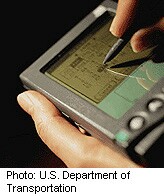Medicare to Pay Bonuses for 'E-Prescribing'
Doctors can earn additional money by initiating computerized prescribing systems.
By Steven Reinberg
HealthDay Reporter
|
E-mail this article
Subscribe to news
Printer friendly version
|

(SOURCES: July 21, 2008, teleconference with Mike Leavitt, secretary, U.S. Department of Health and Human Services; James King, M.D., family physician in Tennessee, and president, American Academy of Family Physicians; Kerry Weems, acting administrator, U.S. Centers for Medicare & Medicaid Services)
MONDAY, July 21 (HealthDay News) -- Starting next year, doctors can earn additional money from Medicare if they use electronic prescribing systems, U.S. health officials said Monday.
The bonus program, which will continue for four years, is designed to streamline the prescription process and cut down on errors. In 2009 and 2010, Medicare will give doctors an additional 2 percent bonus on top of their fee for "e-prescribing." In 2011 and 2012, the bonus will drop to 1 percent, and in 2013, the bonus will drop again to 0.5 percent, officials said.
"There are terrific human and financial costs to illegible prescriptions," Mike Leavitt, secretary of the U.S. Department of Health and Human Services, said during a Monday afternoon teleconference.
According to the Institute of Medicine, 1.5 million Americans are injured every year by drug errors, Leavitt said. Another study found that each year pharmacists make more than 150 million phone calls to doctors to clarify what was written on the prescription, he added.
"That's a lot of people needlessly hurt and a lot of time spent trying to sort out bad handwriting," Leavitt said.
"E-prescribing will help deliver safer or more efficient care to patients," Leavitt said. He noted that the law that set up the Medicare prescription drug program in 2006 mandated that participating pharmacies be able to accept e-prescriptions.
After five years, bonuses for e-prescribing will be phased out; doctors who haven't adopted e-prescribing will be reimbursed at lower rates, Leavitt said. There will, however, be exceptions for doctors who have legitimate reasons for not complying.
"We expect this will have a profound effect on the adoption and use of e-prescribing," Leavitt said.
Medicare started paying bonuses to doctors last year for using the Physician Quality Reporting Initiative, which collects data on the quality of care delivered by doctors. Medicare recently paid the first bonuses to more than 56,000 doctors, totaling more than $36 million. Payments ranged from $600 for individual doctors to $4,700 for group practices.
The new bonuses for e-prescribing will be on top of those paid as part of the Physician Quality Reporting Initiative and other Medicare reimbursements. Medicare expects to save up to $156 million over the life of the e-prescribing program in fewer adverse drug events.
Despite the advantages of e-prescribing, barriers to implementing such systems remain. One of the largest barriers is the cost.
"It is fairly costly for a small practice to begin to change over to e-prescribing," Dr. James King, a family physician in Tennessee and president of the American Academy of Family Physicians, said during the teleconference. "These incentives will help."
It's estimated that it will cost about $3,000 per doctor to initiate an e-prescribing system. It also takes between $80 and $400 a month to maintain and operate a system, Kerry Weems, acting administrator of the U.S. Centers for Medicare & Medicaid Services, said during the teleconference.
Other barriers include state laws that prohibit e-prescribing across state lines, King said. And, there are areas in the country where computer systems are slow and inefficient, he said.
More information
For more on electronic medical records, visit the American Medical Association. 
Copyright © 2008 ScoutNews, LLC. All rights reserved. 
HealthDayNews articles are derived from various sources and do not reflect federal policy. healthfinder.gov does not endorse opinions, products, or services that may appear in news stories. For more information on health topics in the news, visit the healthfinder.gov health library.